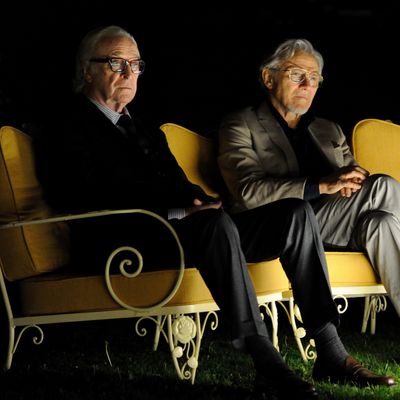
The great Paolo Sorrentino has never made an actual ghost movie, but all his films could be classified as such. From a corrupt Italian prime minister haunting the dark shadows of his palace in Il Divo, to an adrift mob bag-man living in a hotel in The Consequences of Love, to an aging author lost in a limbo of endless parties in The Great Beauty, Sorrentino’s men find themselves trapped in the spaces of his films like alienated, ruminative little specters. Even in the director’s weirdo-rock-star–Sean Penn–hunts-Nazis road movie This Must Be the Place, the lead character felt more like a ghost than a traveler, a broken man looking for belonging more than vengeance. And now, in the perplexing, ravishing Youth, the characters are visitors to a fancy spa nestled in the Swiss Alps. Their stays are ostensibly temporary, but let’s not kid ourselves. They’re not going anywhere.
When we first meet retired composer Fred Ballinger (a touching Michael Caine), he’s declining an offer from the Queen of England’s emissary to perform for Prince Philip’s birthday. For Fred, his work was an expression of love for his wife, who also happened to be his soprano; now that she’s very ill and unable to sing, he doesn’t want to perform ever again. “I find monarchy so endearing … so vulnerable,” he tells the emissary. “You eliminate one person, and all of a sudden the whole world changes. Like in a marriage.” It’s the kind of cumbersome comparison that Sorrentino can occasionally slip into, particularly when it comes to dialogue, but it also speaks to Fred’s own obsessions, his own endless swirl of grief.
Fred’s best friend, Mick Boyle (Harvey Keitel), however, isn’t nearly as ready to call it quits. A renowned filmmaker whose best days are behind him, Mick has brought with him a small gaggle of younger screenwriters to work on his latest film, which he assures Fred will be a masterpiece. But for Mick, watching these younger writers is almost as important as working on his film. “If you only knew how moving it is to see them working on the script,” he reflects, watching them asleep on the couch, like little children. Two of his writers are falling in love, but they don’t seem to know it yet. Keitel, whose performances can at times be too precious, brings just the right amount of warmth to the part. This is the gentlest he’s been in ages.
Fred and Mick spend time with each other (and with Fred’s daughter, played by Rachel Weisz), but many of the other guests at the hotel seem to be cocooned in their own worlds. A famous and somewhat pretentious young actor, played by an eerily watchful Paul Dano (who, let’s note, is having a hell of a year himself as an actor), lounges around as he prepares to make a film in Germany. He loves talking to Fred — telling him that both he and the composer are victims of pop culture, serious artists who became famous for their more lighthearted work — but his demeanor is too calm, his utterances too gnomic to suggest that he’s learning anything from the older man. They talk, but they don’t connect. There’s also a fat Diego Maradona, lumbering in and out of pools and surrounded by a bevy of assistants. And a famous mountaineer. And a whip-smart beauty queen.
Anyway, everybody’s doing their thing, but nobody’s doing anything. As noted, Sorrentino’s characters live in gorgeous cinematic purgatories of the director’s own devising; few directors have made inertness and alienation this compelling and beautiful. For the two characters in Youth, though, the difference is one of awareness. Fred has effectively given up, but Mick — working and slaving and dreaming as he does — isn’t ready to yet. It could be argued, of course, that, like Jep Gambardella, the protagonist of The Great Beauty, Fred’s conscious refusal to reengage with the world steels himself from further disappointment and disillusion, while Mick remains vulnerable. But isn’t Fred’s withdrawal, like Jep’s, a kind of death in itself? And for all of the pathos of Mick’s delusion, isn’t there still something noble in it?
Youth asks interesting questions, and it’s almost always stunning to look at and listen to. But it’s lacking something. Call it forward momentum, maybe. Sorrentino’s characters may be stuck, but his stories don’t need to be. Characters this static and inward-looking sometimes need that extra push — narrative, emotional, whatever — to make sure symbolic tedium doesn’t become actual tedium. And in previous films, the director has found ways to keep us watching, offering through lines, sometimes subtle ones, to pull us in. Youth, for its part, brings in Jane Fonda near the end in a boisterously broad, go-big-or-go-home performance that perks things up but also serves as a reminder of the fragmentary nature of the whole film, its seeming lack of rhythm or purpose. Though often beautiful, this is an emotionally paralyzed film about emotionally paralyzed people.





